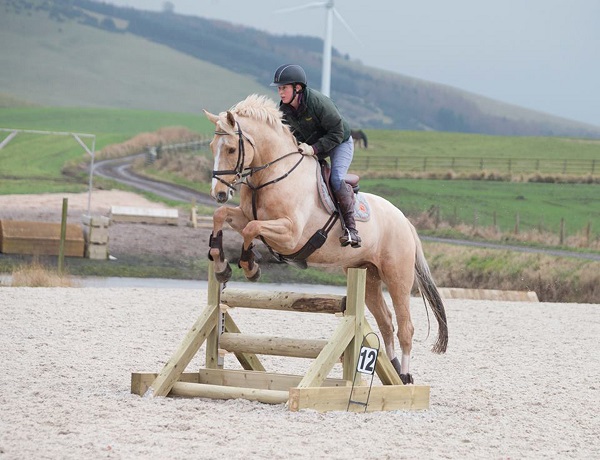Posted: 13th December 2018 | Back to news feed

Living in Scotland, Robinson Animal Healthcare sponsored event rider, Louisa Milne Home, is used to facing the extra challenges of trying to keep her horses in training during winter, so she is just the person to offer advice on how to cope with the unpredictable winter weather.
Louisa tries her best to keep the horses in work throughout winter, so if the weather really does takes a turn for the worse and she is forced into giving them a break, they will still maintain a certain level of fitness.
Louisa said: “Preparation is key to keeping the horses ticking over during winter. Arena management is really important - having a good surface that isn't prone to freezing is essential and you should make sure that you keep it harrowed so that it is level. If the surface is compact it will freeze, if it is level and fluffed up, you will still have something you can ride on; even if it is a little bit hard, you can just work on walk exercises, after all, we can all do better halts and pirouettes.”

Safety is paramount when the temperature drops and surfaces become icy. Salt all pathways to the muck heap and the fields, so the horses can be turned out safely. If it has snowed, clear and salt all the pathways, because if the snow gets compacted it will become treacherous. Salt and a snow shovel are vital pieces of equipment in the battle against winter.
“We like to keep the horses turned out all year round, even if they are only out for a couple of hours, but this really depends on your fields. If they are really wet it isn't worth trashing them, also if the ground is frozen solid it could be worth keeping them in, as you risk bruised feet and strains.” advised Louisa.
Louisa relies on her heat trace cables on the water pipes to stop them from freezing which is a massive help if the weather turns bad, as they prevent burst pipes and the need to lug water buckets across the yard.
She also swears by her drying cupboard for wet rugs, which means that the horses always wear a dry rug and Louisa doesn’t have to have wet rugs in the house.
“We have some heat lamps set up so that helps to keep the horses warm when clipping and grooming and we have invested in a portable hot water shower which is great for getting them ready for shows or if they are really muddy when they come in.” said Louisa.
After washing the horse’s legs, Louisa always uses Veterinary Gamgee® and bandages to thoroughly dry the legs, to help avoid any skin irritations.
Weather permitting, Louisa likes to hack the horses out as much as possible and she uses traditional Newmarket blankets which are heavy and don’t flap around in the wind and also help to keep their muscles warm as all her horses are fully clipped.

As the possibility of snow is more likely where Louisa lives, she likes nothing better than riding around her snow-covered fields: “It is great for the horses as they have so much fun. As long as the snow isn't balling in their feet, it is really good fitness.” added Louisa.
Finally, it is very important to keep yourself warm, with Louisa admitting that she hates the cold: “Good riding boots help, as does a three-quarter length coat that covers the top of your legs when riding. When it is really cold a snood is great, and I wear leggings underneath my breeches. I am not a fan of over-trousers as I always feel a little bit less secure in the saddle and the horses tend to be fairly fresh if the weather is bad.”
Robinson Animal Healthcare has a wide range of products for all your first aid requirements including the market-leading Animalintex®, which is the only VMD licensed, multi-layered absorbent poultice available in the UK along with the original and legendary Veterinary Gamgee®.
For more information contact Robinson Animal Healthcare on 01909 735 000 or visit www.robinsonanimalhealthcare.com
The Equestrian Index newsfeed is compiled from articles submitted by advertising members and expresses the opinions of those members. Watsons Directories Ltd shall not be held liable for any inaccuracies or mis-statements therein.